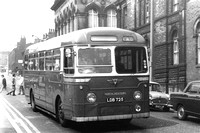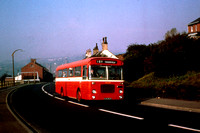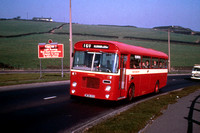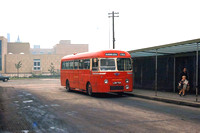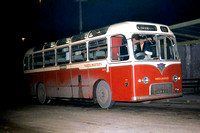Created 23-Jun-24
Modified 23-Jun-24
Visitors 5
5 photos
This roots of this service between Oldham and Huddersfield lie in North Western’s Oldham to Pinfold service which commenced operation on the 8th April 1925. This went from Oldham through Lees to Uppermill, over Standedge and then through Marsden to Pinfold, which was near Milnsbridge and most importantly was the Huddersfield boundary.
Huddersfield Corporation would not grant North Western licences to operate buses within the Borough, however Marsden and Linthwaite Councils were happy to do so for their part of the route. Huddersfield’s reasons were largely with the aim of protecting their tram revenue, but as the trams ran as far as out as Marsden this objective wasn’t really achieved. However, the frequency of the bus service at this stage would have meant the impact was minimal.
The initial service only ran the full length of the route on Saturdays and Sundays and it took a bus one and three-quarter hours to get from one end to the other! When you consider the hill-climbing abilities (and braking) of the contemporary Tilling-Stevens petrol-electrics the journey time is perhaps not too surprising. On other days of the week the service ran from Saddleworth Station to Marsden, whence passengers could catch a tram to Huddersfield. The rather unusual starting point of Saddleworth Station was the result of complex inter-working, whereby the one bus worked parts of three separate services. I believe even these weekday workings ceased by the end of 1928.
The Pinfold to Oldham service seems to have ceased on 23rd March 1929, with the service being replaced from 28th March 1929 by a new Manchester to Huddersfield service, which was the beginning of the Liverpool to Newcastle express service (see the X97).
A new service was introduced between Oldham and Huddersfield from 3rd December 1932. The revised route mainly followed the A62, but coming from Oldham would leave it at Delph Cross Roads, head through Delph High Street and then use Delph Lane to regain the A62 to continue to Huddersfield.
Demand for the service was clearly very variable as small Dennis Aces are believed to have been used during the 1930s, yet in this same era the weekday service which was every two hours was replaced with an hourly one on Saturdays. However, the service was completely suspended during World War II around 1940, resuming on 2nd October 1946.
The postwar service settled to a two-hourly frequency although as time progressed some journeys were changed to only run on certain days. Continuing decline in demand saw North Western withdraw the service completely after operation on 30th December 1970.
Huddersfield Corporation would not grant North Western licences to operate buses within the Borough, however Marsden and Linthwaite Councils were happy to do so for their part of the route. Huddersfield’s reasons were largely with the aim of protecting their tram revenue, but as the trams ran as far as out as Marsden this objective wasn’t really achieved. However, the frequency of the bus service at this stage would have meant the impact was minimal.
The initial service only ran the full length of the route on Saturdays and Sundays and it took a bus one and three-quarter hours to get from one end to the other! When you consider the hill-climbing abilities (and braking) of the contemporary Tilling-Stevens petrol-electrics the journey time is perhaps not too surprising. On other days of the week the service ran from Saddleworth Station to Marsden, whence passengers could catch a tram to Huddersfield. The rather unusual starting point of Saddleworth Station was the result of complex inter-working, whereby the one bus worked parts of three separate services. I believe even these weekday workings ceased by the end of 1928.
The Pinfold to Oldham service seems to have ceased on 23rd March 1929, with the service being replaced from 28th March 1929 by a new Manchester to Huddersfield service, which was the beginning of the Liverpool to Newcastle express service (see the X97).
A new service was introduced between Oldham and Huddersfield from 3rd December 1932. The revised route mainly followed the A62, but coming from Oldham would leave it at Delph Cross Roads, head through Delph High Street and then use Delph Lane to regain the A62 to continue to Huddersfield.
Demand for the service was clearly very variable as small Dennis Aces are believed to have been used during the 1930s, yet in this same era the weekday service which was every two hours was replaced with an hourly one on Saturdays. However, the service was completely suspended during World War II around 1940, resuming on 2nd October 1946.
The postwar service settled to a two-hourly frequency although as time progressed some journeys were changed to only run on certain days. Continuing decline in demand saw North Western withdraw the service completely after operation on 30th December 1970.
© David Beilby
